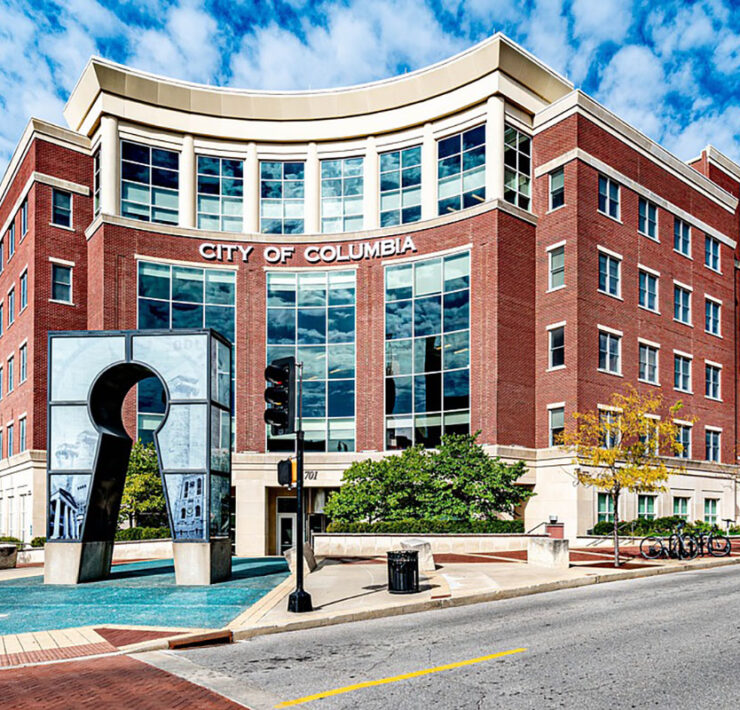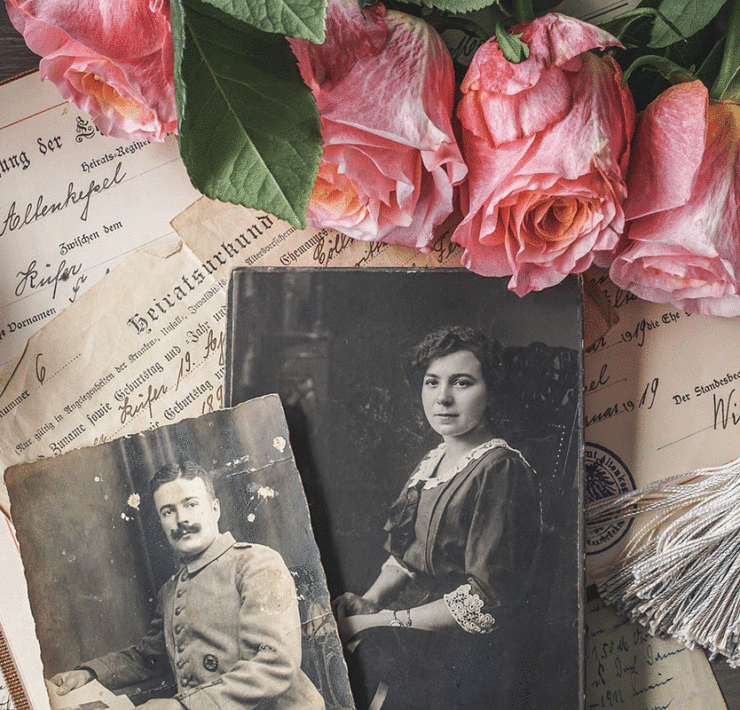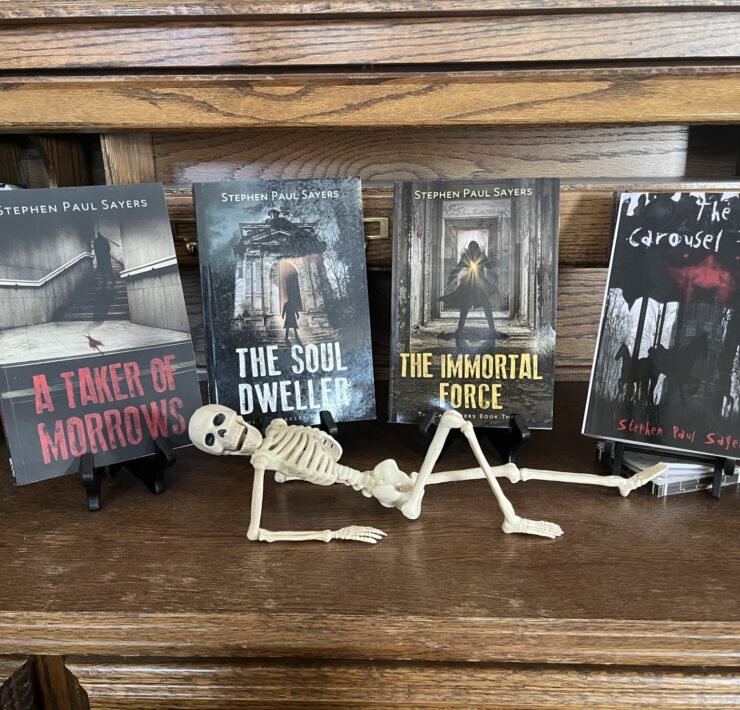The Human Cost of Policing
- This story originally appeared in the July 2024 "City" issue of COMO Magazine.
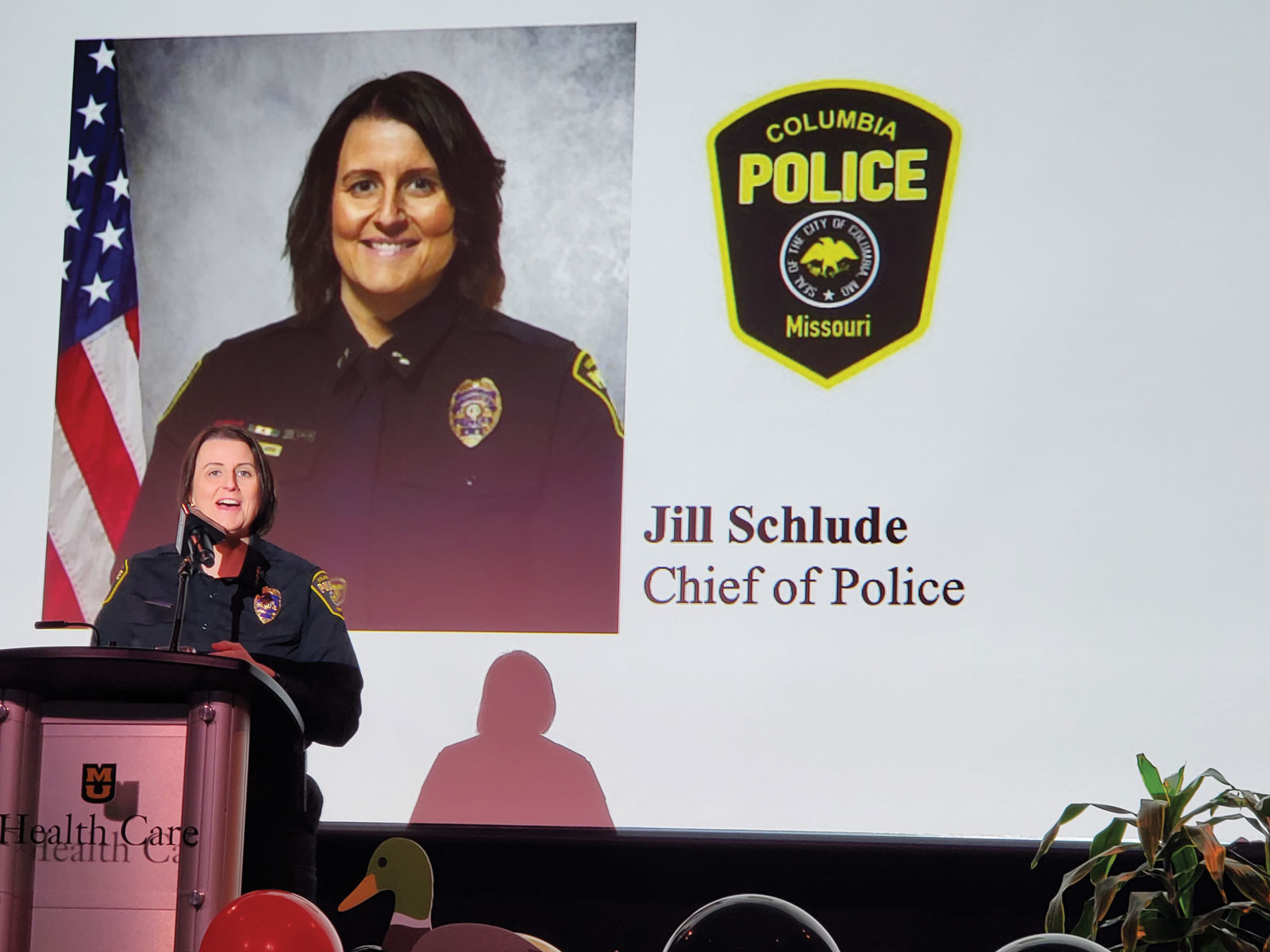
Chief Schlude forecasts an end to CPD’s ‘staffing slump.’
Jill Schlude is listening.
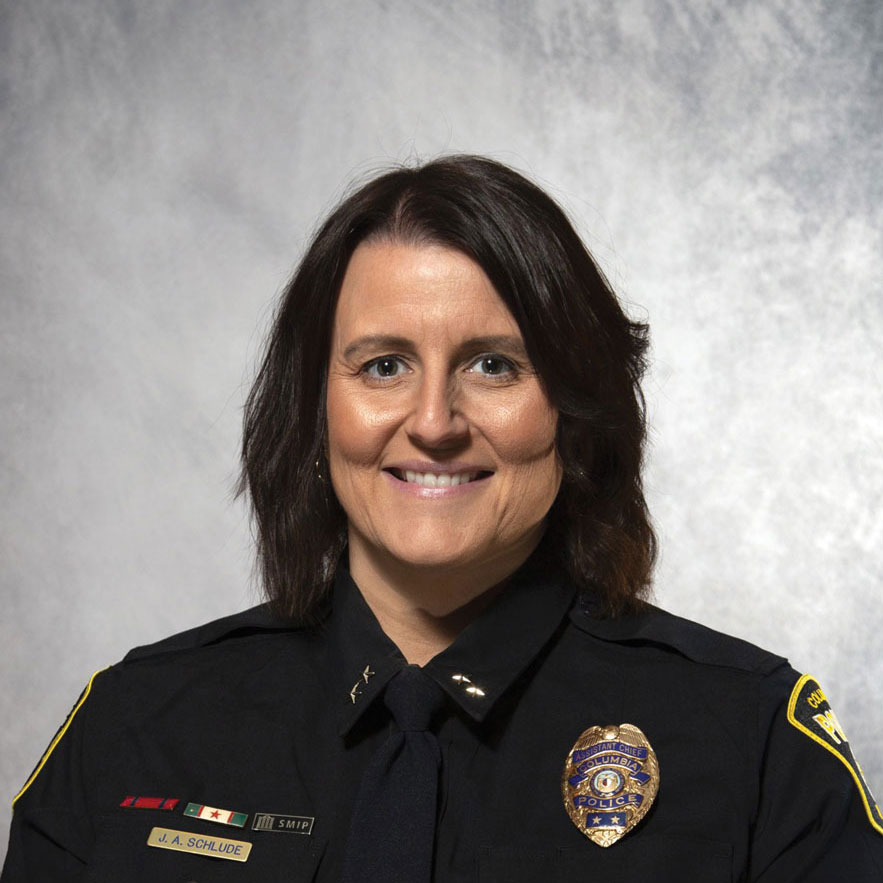
With nearly twenty years in various roles with the Columbia Police Department, Schlude became the city’s first female police chief in December 2023, making her the face of the department that is currently understaffed by 31 positions. Though the staffing picture is better than it was twelve and even six months ago — and officer salaries now start at $60,000 — the shortage takes a toll on the department’s ability to respond quickly to calls for service.
And it takes a toll on her officers.
“There’s the human cost of being a police officer,” Schlude said. “As the chief, I get to get out in the public a lot, and a lot of people — well, some have complaints, of course — but a lot of people try to relate to me how much they appreciate our police officers.”
Occasionally, a batch of cookies, snacks, or a bundle of “thank you” cards, usually from a kid’s group or civic organization, will show up at CPD headquarters in downtown Columbia. But the day in and day out contact with the public — the ability for officers to build relationships and hear those kudo with their own ears — is sorely lacking because of the staffing shortage.
“If I’m a police officer going from angry person to upset person to victimized person to tragedy … That doesn’t get my tank filled,” Schlude explained. “I think that [interaction] is part of what keeps officers going. It kept me going.”
The recent pay hike and continued increased spending on public safety — police and fire departments, primarily — will help Schlude’s department overcome what she calls a “staffing slump.”
During a roughly sixty-day period from April through May, the department received an average of one application per day. CPD is also working with a marketing agency to attract new and veteran police officers. The pay hikes and additional officer positions in the budget will help, but ultimately the department simply needs a larger police force, she said.
The department operates a system with eight “beats” divided between north and south, and those areas are divided into sectors that, at least in theory, helps achieve so-called community policing where officers patrol specific areas.
But in practice …
“Generally, by one or two in the afternoon, the call volume picks up. By five p.m., there are 20 or 25 calls holding,” Schlude explained. “They’re just jumping from call to call — not really getting a chance to develop relationships. It’s hard to get there when the same officer can’t stay in the same area for long.”
The traditional model for police staffing and work is to spend one-third of the time responding to calls for service; one-third of time involved in “proactive work” such as traffic patrol or going into schools and other duties not related to a dispatch call; and one-third of the time for administrative duties — processing evidence and filling out paperwork and reports.
Schlude concedes: “We’re not anywhere close to that.”
The FY2024 budget for October 1, 2023, to September 30, 2024, showed the police department with expenditures of $33.74 million, an almost 9 percent increase from the previous year. Though there’s a lingering public narrative in some circles that the Columbia City Council wants to “defund” the police — “that’s not true,” Seewood said — that notion is further dispelled by the additional appropriation of $800,000 made in April for CPD pay raises. Pay adjustments are being implemented throughout city government in response to a salary and compensation study.
Columbia Police Chief Jill Schlude was a guest speaker at the February 21, 2024, Columbia Chamber of Commerce quarterly membership breakfast. Schlude was among attendees who wrote and colored cards for pediatric patients at MU Health Care’s Children’s Hospital.
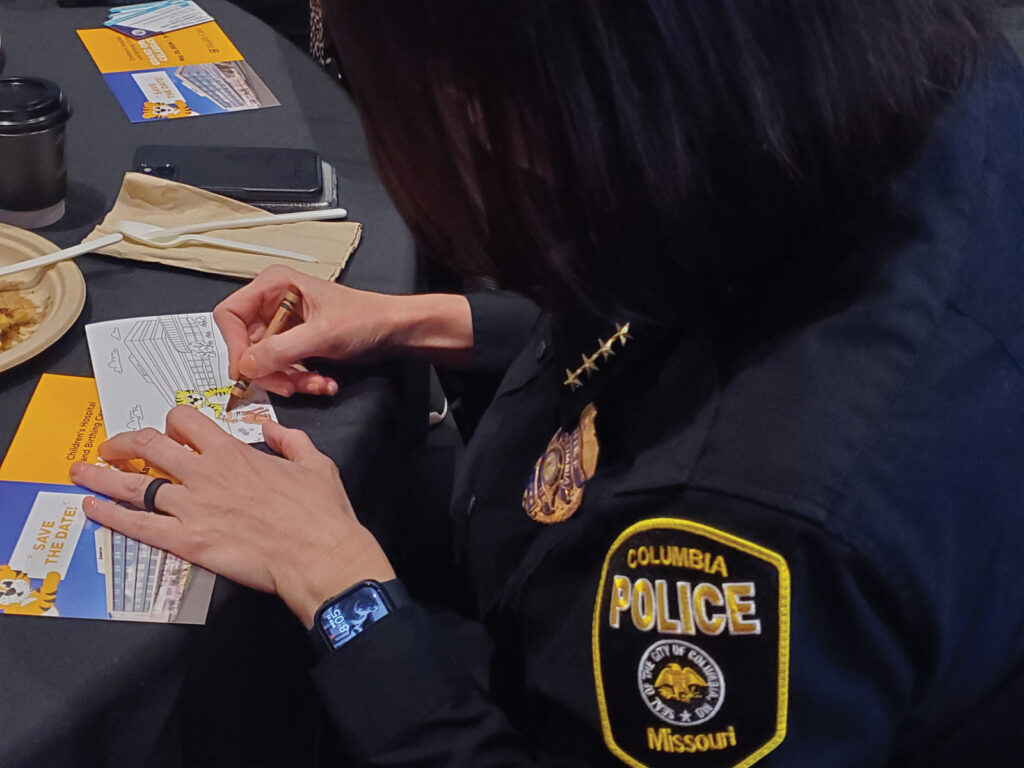
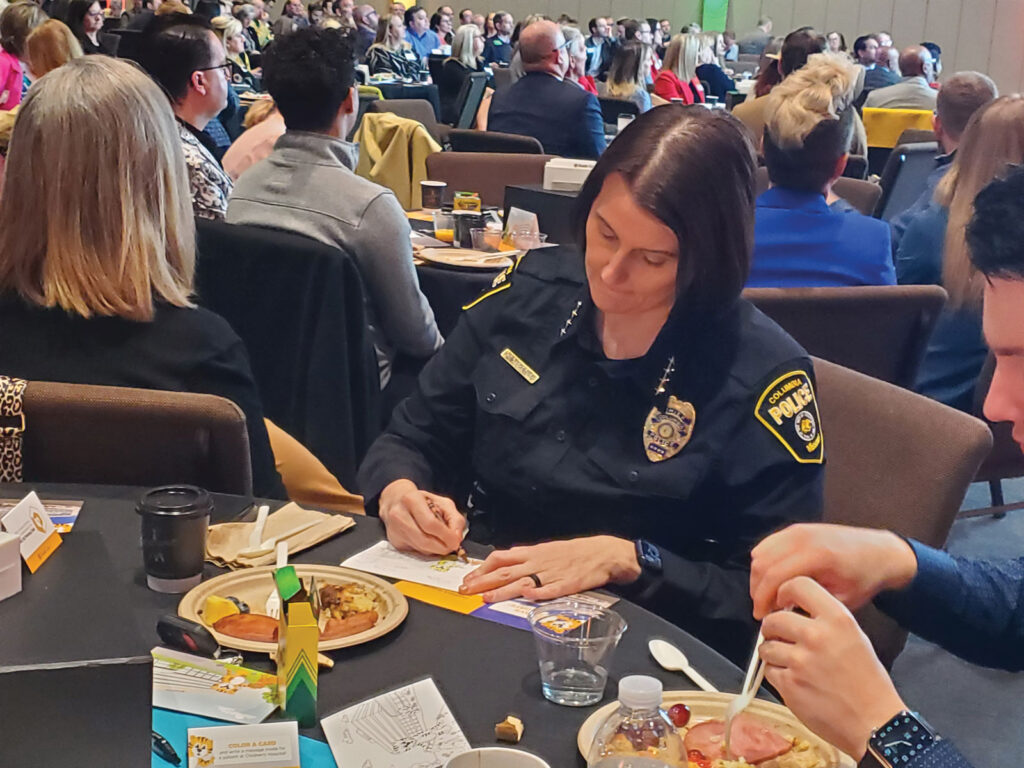
Public safety — police, fire, and municipal court — now account for $63.65 million, or 48 percent — of the city’s overall budget of $131.85 million. Public safety had an 11 percent increase over FY 2023. Columbia police officers also received a 4 percent pay increase in the summer of 2023.
Schlude said another important aspect of the pay raise package was including step raises based on years of service. For instance, hires with previous experience now start at a commensurate pay step up to ten years. Schlude refers to that as “lateral pay,” and noted that an officer was hired at CPD after serving in law enforcement in Callaway County, and he entered the new pay plan based on years of service to start with a salary at a little over $73,000.
Columbia’s police budget is based on 192 positions, though there are currently thirty-one vacancies: twenty-nine for officers and two for sergeants. Currently there are eight officers in field training and four others began training at the local academy in late June.
“We’ve dug out of the hole by about ten officers,” Schlude added. “Obviously, getting fully staffed at 192 looks a lot different for the officers than 161.” She said there are currently fifty-six officers on patrol each day, that number should be at least eighty.
“A city this size, we probably need a hundred officers on patrol, easily,” she said. “We’ve just fallen behind over the years.”
Meanwhile, the state’s third largest city, Springfield, has a police force more than 300 strong. Independence — the city Columbia displaced as the state’s fourth largest — has a police force “well into the upper 200s.”
Though the city has increased police spending in recent budget cycles, the growth in full-time officer positions has not kept pace with the city’s growth and development, Schlude said.
“We may add four to five police officers, but if you compare that to population growth, the math doesn’t work out,” she said. Schlude suggests taking a more data-driven approach to police staff expansion in the same way the city plans for growth with other infrastructure such as sewer service, roads, electric, and water.
“If we build another subdivision, let’s ask, ‘What kind of police services are needed?’” she explained. “I don’t think we’ve ever gotten to that planning strategy. And Columbia is continuing to grow.”
Another consequence of having a short-staffed police department is a significant uptick in shoplifting and similar crimes, such as “porch pirate” activity. She adds, “Our job is to make the environment less attractive to commit crimes.”
“We’ve actually had suspects tell us that when we had fully staffed, proactive units” for street crimes and other special units “that people did not feel as comfortable riding around in cars with guns,” Schlude said, adding that felons who get caught with a firearm are usually referred to federal court, where offenders must serve 80 percent of their sentence.
Meanwhile, an initiative from City Manager De’Carlon Seewood to create the Office of Violence Prevention is aimed at helping divert some calls or to address mental health or social service needs. The new office will aim to identify community organizations and nonprofits that can provide services for issues such as mental health crises, substance abuse, and other factors that contribute to crime.
Seewood called those services “violence interrupters.” He is including that office in his proposed 2025 fiscal year (FY) budget that he will submit to the city council in July.
Schlude welcomes the additional help, adding that cutbacks or gaps in social and mental health funding and services “get dumped on public safety and law enforcement.” Case in point? As many as 20 to 25 percent of police calls are for trespassing, verbal threats, or weapons and fighting that are connected to individuals who are homeless or panhandling at street corners or in front of businesses.
“Some days it seems there’s an element of homeless folks involved in about 40 percent” of calls, she added. “We are inundated with calls about people sitting in the medians. We get a significant number of calls about trespassing, encampments, checking the welfare of someone.”
But there is not a simple solution.
“There are folks who don’t cause any trouble — they want to be left alone. They’re not people we deal with on a regular basis — locking themselves in a bathroom downtown or threatening people,” she explained. Then there’s the “nuisance” part of the picture: those who are camping on private property, trespassing, or verbally abusing passers-by and motorists. “A smaller part — folks that clearly have a mental health issue, some type of substance abuse issue — “those are the most concerning calls for us.”
Schlude is hopeful that the Office of Violence Prevention can help with resources to provide long-term help to individuals who need it, adding, “That part is just missing. I think that’s a huge detriment for some of the folks out there who really need help.”
She also noted that Columbia police officers are well within their discretion to arrest someone when the situation warrants that action. There is also the Divert program and several services that can be used.
“No one is being told, ‘You can’t arrest a homeless person,’” Schlude explained. “We’re just asking them to find the best tool to address the situation.”
Schlude said she is listening to community concerns, and it’s a certainty that CPD officers are also listening.
“Some of the time officers feel they are just fighting a losing battle,” she added. “They see things on the news, social media — inaccurate things.”
Schlude wants the public to get more involved with city matters and to understand that police officers are also members of the community.
“Police officers are not going to be able to solve homelessness and social issues. They’re not housing specialists or substance abuse counselors,” she said. “We have people who are expecting them to do those things.”
As for her expectations, Schlude has added a professional standards bureau as a first step toward seeking official accreditation for the Columbia Police Department, which she says is “full of great people.”
She adds, “There’s whole group of men and women out there every day who are trying to do the best they can do with the resources that they have.”



